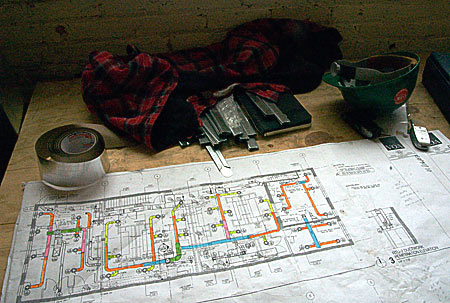IN ALL OF D.C.’S THEATERS, you won’t find a story like Source’s.

Long known as a place that fosters emerging talent, the Source Theatre set up shop on 14th Street NW in 1977. Although the area today is a thriving arts corridor, Source’s debut was less than a decade after devastating riots ravaged the surrounding Shaw neighborhood, spawning an influx of crime, drugs and prostitution.
From its earliest days, Source did theater with a capital T: gay Holocaust dramas, Strindberg, Shakespeare. Plays put together on a shoestring budget, performed in a theater with a curtain and a set of mismatched folding chairs — and not much else. It had some commercial successes, but also a few flops. Yet the money didn’t matter … until it did.
After a string of financial problems, the Source Theatre Company produced its last season in 2002, and later rented its only asset — its building at 1835 14th St. NW, next to Bar Pilar and the Black Cat, which it bought in 1987 — to theater groups in need of a spot to rehearse and perform. In 2006, the company was poised to sell the building to Bedrock Management — owner of Bedrock Billiards and Buffalo Billiards, among others — which planned to turn it into a pool hall.
That’s when the Cultural Development Corp. came in, armed with money it had gathered to save the theater. After the purchase was completed, Cultural Development began renovating the building, replacing the roof and upgrading the sound and light systems — an effort slated to finish in the summer.
Karyn Miller, Cultural Development’s manager of communications, said the group intends to maintain Source’s “spirit of supporting emerging artists” by renting space to arts groups, similar to the way Flashpoint, which it also owns, works.
This new organized culture is a far cry from the scrappy Source of the 1980s.
On one hand, during that time Source fostered its fair share of talents who’ve moved on to more prominent pursuits, including Marcia Gay Harden, Charles Busch, Nancy Robinette and Rick Foucheux. But back in its earlier days, the improvisation at Source didn’t just take place on stage.
There was the time the lights went off in the middle of a play. There was the hole somebody cut in the upstairs rehearsal room floor to run an extension cord from the marquee lights to an outlet on the ground level. (Cultural Development is filling the hole and having lights wired properly.)
There were the Theater Alley plays, performed in the actual back alley behind the theater. The audience sat in makeshift bleachers and kids watched from the nearby rooftops.
Then there were the financial troubles. Like the time Pepco shut off the electricity when the troupe fell behind on its bills. Or when water pipes burst, causing $600 in damage. Then came fire, theft and the threat of eviction.
In 2004, Joe Banno, the troupe’s artistic director, announced that Source was closing from March to midsummer. Instead of kicking out the renters, which included the Actors’ Theatre of Washington and the In Series group, he asked them to forward their rent money to Pepco to keep the lights on in their offices.
By 2006, the Source company owed more than $600,000 to the Internal Revenue Service, utility companies and others. The company ceased operations, and Bedrock Management offered $2.8 million for the building. But at the last minute and after much protest, Cultural Development bought the building for the price of Source’s debt.
Source’s troubles didn’t end there, though. Cultural Development paid Source’s creditors, but also assumed a hefty mortgage owed to the city. Since then, the organization has negotiated a debt-forgiveness plan by providing services to the community — “things like free tickets to the community, allowing community groups to use the spaces, et cetera,” according to Miller.
The building was expected to reopen after renovations in mid-2007, but funding problems meant the work didn’t start until last month.
“We were going after some government grants that had a lot of hoops,” Anne Corbett, Cultural Development’s executive director, said. “And we jumped, and we jumped, and jumped and eventually we failed.”
Since then, the theater’s fortunes have improved. This week, air ducts are being hammered into place and walls are going up to create collaborative office spaces. And the pinnacle of the Source’s resurrection could be the revived Source Festival — once called the Washington Theatre Festival — which showcases new work by actors, directors and playwrights. So far, Cultural Development says it’s received a staggering 900 submissions for the three-week event, which is scheduled to kick off in the renovated theater in June.
With such a long history of woes, some might think Source is cursed. But Corbett isn’t one of them.
“If it was cursed,” she said, “it would be a billiards hall.”
0 Comments Leave a comment